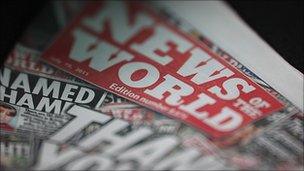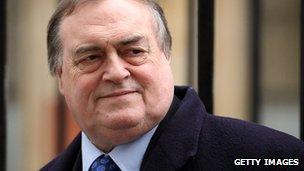Press publish new watchdog details
- Published

Press regulation faced intense scrutiny after the phone-hacking scandal at the News of the World
The newspaper and magazine industry has published details of how a new press watchdog, the Independent Press Standards Organisation, could operate.
A new industry-established regulator, to replace the Press Complaints Commission, was recommended by the Leveson Inquiry report on the press.
Politicians and the press are at odds over the details of a proposed royal charter to underpin the regulator.
Campaign group Hacked Off said the move was "a cynical rebranding exercise".
The publishers of the new plans said the regulator would be "a complete break with the past and will deliver all the key Leveson recommendations".
Lord Justice Leveson's inquiry was set up in July 2011 after it emerged journalists working for the now-defunct News of the World had hacked the mobile phone of murdered Surrey schoolgirl Milly Dowler.
'Systemic wrong-doing'
Plans in the Independent Press Standards Organisation draft constitution,which will be considered by more than 200 publishers before being finalised, include:
The power to impose £1m fines "for serious or systemic wrong-doing"
A whistleblowers' hotline for journalists
A warning service to alert the press "when members of the public make it clear that they do not wish to be the subject of media attention"
A standards and compliance arm "with investigative powers to call editors to account"
An arbitration service "to offer a speedy and inexpensive alternative to the libel courts, subject to the successful conclusion of a pilot scheme"
But Brian Cathcart, executive director of Hacked Off, which represents phone-hacking victims, said: "This is no more than a cynical rebranding exercise, the latest rearguard action by press proprietors and editors who want to defy the will of Parliament and of the Leveson Inquiry.
"They are determined to hold on to the power to bully the public without facing any consequences."
He added: "They have been told by Lord Justice Leveson and by Parliament that they must set up a self-regulator that meets basic standards of independence and effectiveness.
"What they are saying here is that they will not meet those standards but they will meet their own, which are appallingly low."
Key differences
The government's royal charter proposals on underpinning the regulator, which have cross-party backing, were published on 18 March.
Last week, Prime Minister David Cameron confirmed that a rival royal charter plan submitted by newspapers will be formally considered by the Privy Council before the government's own plans.
The BBC understands the council will not now make a decision until autumn at the earliest.

Lord Prescott has resigned from the Privy Council over the delays
Monday's statement stressed that "the establishment of the Independent Press Standards Organisation does not depend on approval of a royal charter".
"This is important as the royal charter approval process, which begins this week with the setting up of the Privy Council sub-committee announced by [Culture Secretary] Maria Miller, may take some months to complete.
"It is already eight months since Leveson delivered his report and the industry does not believe the public can be expected to wait longer before a new regulator is put in place."
There are a series of key differences between the industry's royal charter plan and that agreed by politicians and campaigners.
The newspapers' rival press royal charter would:
Remove a ban on peers and former editors serving on the newly-created "recognition panel", which will decide in future whether newspapers are being regulated properly
Remove Parliament's power to block or approve future changes to regulation. Instead the regulator, trade bodies and the recognition panel would have to agree to changes
Make it more difficult to bring group complaints
Give the regulator the power to "require", rather than "direct", the nature, extent and placement of corrections, and abandon the idea of giving it the power to force newspapers to publish apologies
At the weekend, Lord Prescott announced he had resigned from the Privy Council, saying the hold-up in changes to press regulation was a "political" choice that "borders on conspiracy".
- Published6 July 2013
- Published3 July 2013
- Published3 July 2013